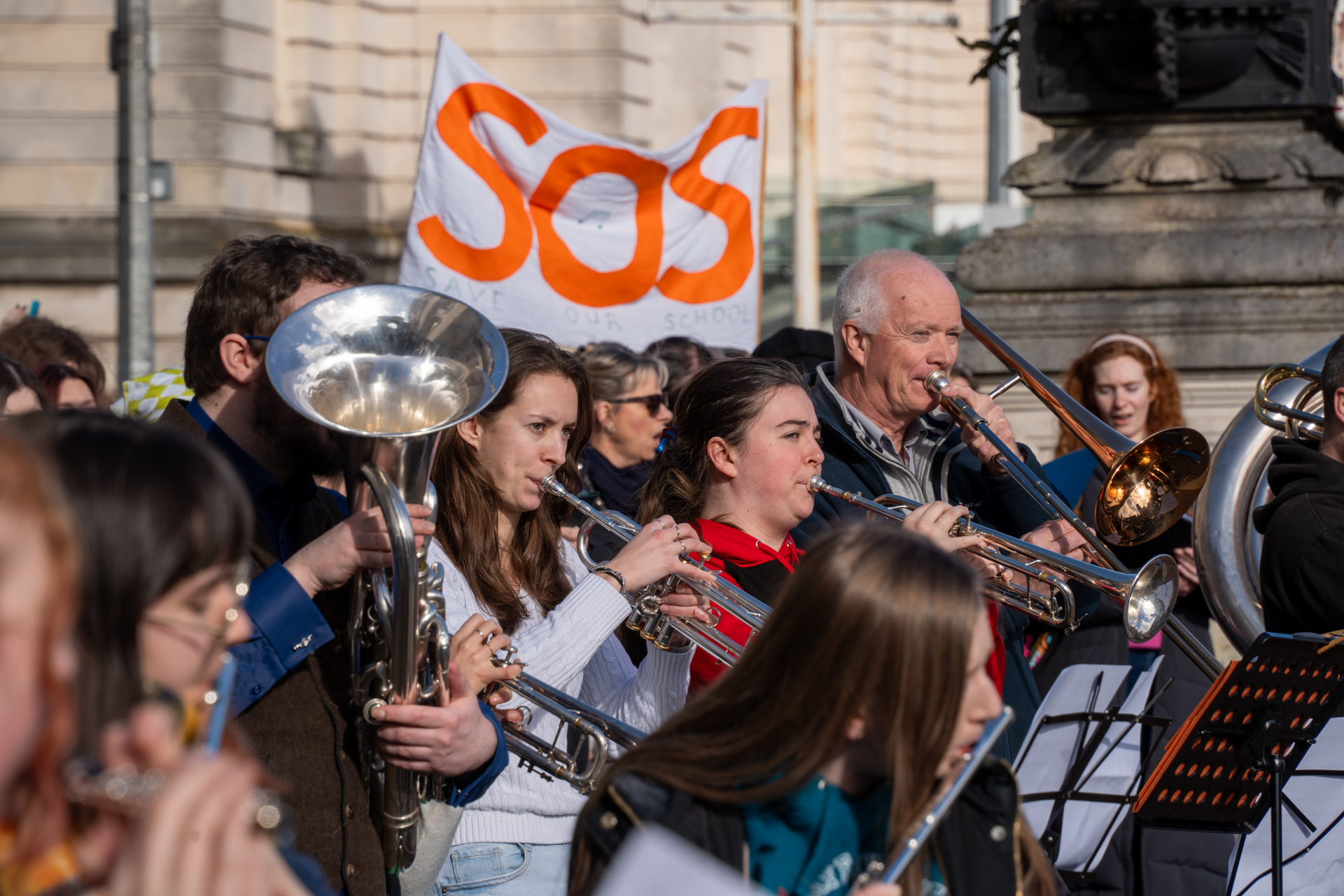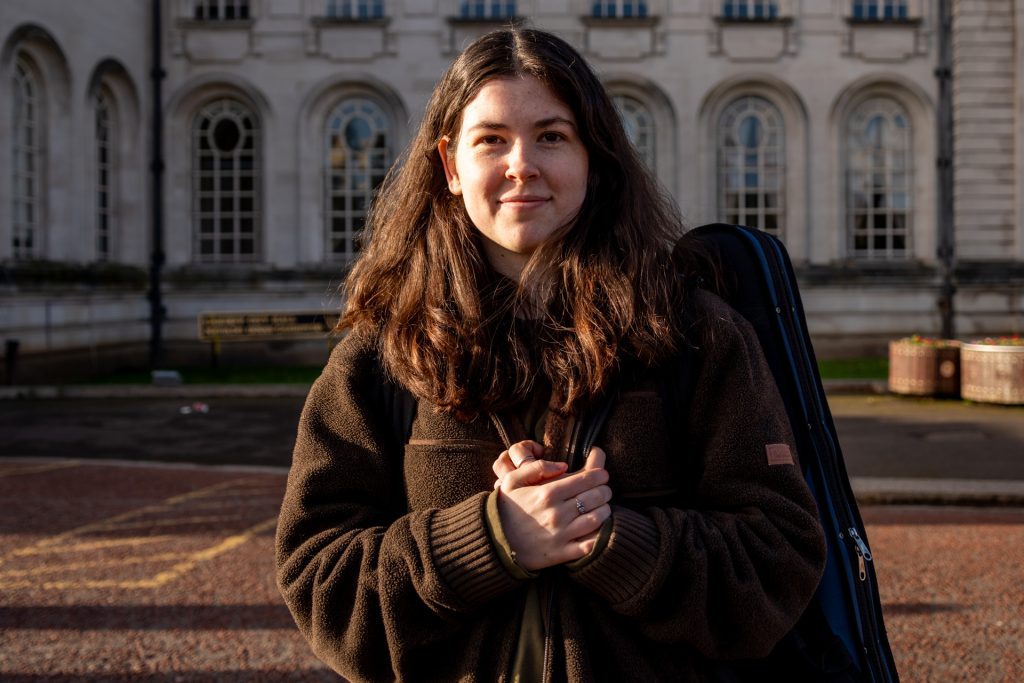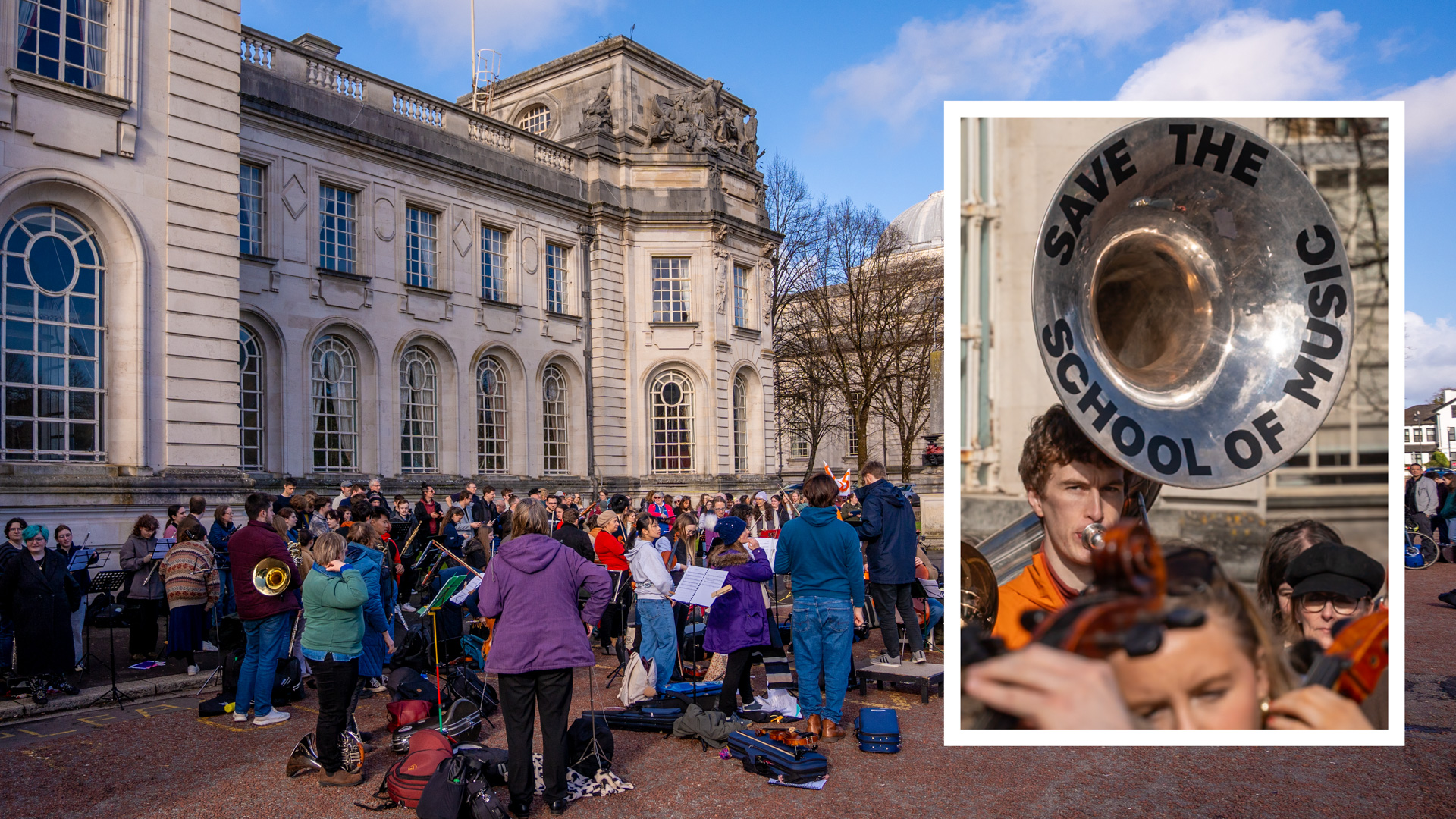Students and alumni fear for the future of Welsh music as Cardiff University threatens to axe programmes
HUNDREDS of musicians took to Cardiff’s streets to protest against the proposed closure of Cardiff University’s School of Music.
“We are outraged at Cardiff University’s decision to cut music from the curriculum and call on Vice-Chancellor Wendy Larner to reverse this decision,” said the Committee of Concerned Musicians.
Protesters marched from Museum Avenue to Cardiff City Hall on Saturday (February 22).
Cardiff University has proposed cuts which target several major university departments. If they go ahead, 400 academic positions will be lost, and programmes in music, ancient history, modern language, religion and nursing will be axed.
Final decisions are expected by June 2025.
In the meantime, a petition to save the School of Music has gained more than 25,000 signatures.

“Look at what we have here,” said conductor Mark Eager, nodding toward the “Salvation Orchestra”— a group of students, supporters and alumni from as far back as the 50s.
“What other university department would inspire this level of human endeavour?
“The decision is unthinkable. Without investment in the arts, nothing becomes entrenched, and we risk losing what little we have left. Welsh National Opera has been severely affected by cuts. Can we still say Wales has a good music scene?
“This is one of the UK’s most prominent music departments. We risk so much by losing it.”
Earlier this year, a Senedd Committee report ranked Wales second lowest in Europe for per-capita cultural spending, just above Greece. Arts Council Wales has seen a 40% funding reduction since 2010, leaving institutions like Welsh National Opera and National Theatre Wales struggling.
“The pipeline from school to university is breaking,” said Monika Hennemann, a professor at the School of Music. “Fewer students are taking A-Level music, and county music services are disappearing.
“Our students go on to do amazing things— not just in music. The skills they acquire set them up for life. They become team players, people with passion.
“Getting rid of music makes no sense. The world will not be brought together this way.”

Professional musicians and supporters joined the Salvation Orchestra from across the UK, performing works by notable alumni, including Sir Karl Jenkins’ Adiemus and Palladio, and Morfydd Owen’s Threnody.
Sir Karl, one of the most performed living composers, described the closure as “devastating” and wrote to the Committee of Concerned Musicians in support, apologising for his absence at the march.

“This is going to kill the Welsh music scene,” said Gail Pearson from Neath, who studied at the department in 1984 and is now the vocal coach for the BBC National Chorus of Wales.
“The university creates educators, administrators, therapists, and publishers as well as performers. These are practical skills – this is not an elite institution.”
Left: Gail Pearson Credit: James Bessant Davies
A Cardiff University spokesperson said: “These are proposals—our community’s views, including those of staff, students, and external stakeholders, will shape the final decision.
Read more:
- Nursing lecturers protest their jobs being put at risk as part of Cardiff University proposals to axe courses
- Watch: Students protest against plans to close Cardiff University’s music school
- ‘There’s something about Grangetown’: Its colourful story celebrated by the people who live there
“In the short term, there will be no immediate impact on music students or their ability to complete their studies. We will also accept students onto music degree programmes in 2025.”
But many fear students will avoid a department set to close, and the standard of musicians in the university orchestras will not be maintained.

Matt Bowen and Mary Lillington studied at the music school, and met while playing together in the university brass band.
“I came to Cardiff planning to study law,” said Mr Bowen, a horn player from Taunton. “I popped my head into the music department and thought—this is what I want to do. The community here is unlike any other.”
Miss Lillington agreed: “We’re close across all years. Everyone comes together in orchestras and ensembles. I’ve grown so much as a person.”

Hannah May, has returned for her fourth year at the Music School following a year abroad spent in Canada.
“Of course I’ve studied music, but I didn’t come to be a performer – the degree has been broad, and it’s given me a grounding in philosophy, history, and life.”
Left: Student Hannah May. Credit: James Bessant Davies
“I was devastated when I first heard the news about the closure. Angry, upset – you know – all of the things. But I think we’ve really come together as a department. It’s uplifting to see this community in force today.”
The School of Music scored 94.6% for overall teaching satisfaction in the 2024 National Student Survey, placing it among the UK’s top music departments.
Notable alumni include Grace Williams, Wales’ most prominent female composer, Welsh composer Alun Hoddinott, and Ursula Harrison, BBC Young Jazz Musician of the Year 2024.




